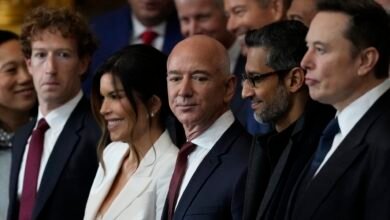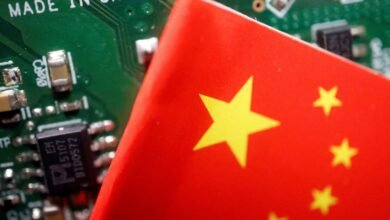
A Forever 21 store in New York, in March 2025.
Yuki Iwamura | Bloomberg | Getty Images
The shadow of a U.S. recession is growing longer and darkening the outlook for both consumers and CFOs alike, according to various surveys tracking sentiment in March. That said, Wall Street has risen over the past three days — investors, perhaps, are cautiously optimistic that President Donald Trump will soften his stance on reciprocal tariffs.
Across the pond, German software-maker SAP, riding a wave of stock gains has taken the crown of Europe’s most valuable company — it has risen almost 10% so far this year. Meanwhile, over in China, electric vehicle maker BYD has overtaken Tesla in annual revenue.
Still, the U.S. occupies such a central role in the global financial and economic system that if a recession were to happen, it would undoubtedly have widespread repercussions. Companies like SAP and BYD, despite enjoying a good run so far this year, may be unable to escape the turmoil on the other side of the ocean.
What you need to know today
U.S. stocks eke out small gains
On Tuesday, the S&P 500 added 0.16%, the Dow Jones Industrial Average ticked up 0.01% and the Nasdaq Composite rose 0.46%. That was the third straight positive session for all three indexes. Asia-Pacific markets climbed Wednesday. Australia’s S&P/ASX 200 was up 0.71% on data that inflation in the country slowed to 2.4% year on year in February, down from January’s 2.5% and below expectations from economists in a Reuters poll.
Consumers lose confidence
The Conference Board’s index of U.S. consumer confidence slipped to 92.9, a 7.2-point decline and the fourth consecutive monthly contraction. It’s also lower than the 93.5 reading expected in a Dow Jones survey of economists. The measure for future expectations tumbled 9.6 points to 65.2, the lowest reading in 12 years and well below the 80 level that is considered a signal for a recession.
Fears of a downturn on the horizon
Other surveys are also registering heightened recession fears. Around 60% of CFOs expect a U.S. recession in the second half of the year, according to the latest CNBC CFO Council quarterly survey. A separate Deutsche Bank survey found that the probability of a downturn in growth over the next 12 months is about 43%, going by the average view of 400 respondents during the period of March 17-20.
Additions to the U.S.’ ‘entity list’
The U.S. Department of Commerce’s Bureau of Industry and Security on Tuesday added 80 organizations, with more than 50 from China, to an “entity list.” American companies need government permits to supply items to firms on the list. Chinese entities were targeted for their alleged involvement in developing advanced artificial intelligence, supercomputers and high-performance AI chips for military purposes, the department said.
BYD revenue blasts past Tesla’s
Chinese automaker BYD reported annual revenue of 777 billion yuan ($107 billion) for 2024, in a filing published Monday. Bolstered by sales of hybrid vehicles, that figure represents a 29% increase in revenue from the previous year — and exceeded the $97.7 billion annual revenue reported by Elon Musk’s Tesla. The filing comes shortly after BYD announced a new battery technology that it claims can charge EVs within five minutes.
SAP surpasses Novo Nordisk
Software-maker SAP became Europe’s most valuable company this week. The German company had a market capitalization of around $343.3 billion by Tuesday’s close, according to LSEG data, with shares rising 1.33% on the day and up more than 40% over the last year. SAP takes the spot as Europe’s most valuable company from Novo Nordisk, the Danish pharmaceutical giant known for its weight management drugs Ozempic and Wegovy.
[PRO] Real culprit of Tesla’s slump?
Tesla’s stock has been sinking in recent weeks — though it’s pared some losses over the past two days — with many attributing the beating to CEO Elon Musk’s dealings in Washington, D.C. However, investment bank Piper Sandler thinks the real culprit dragging down shares of Tesla can be found elsewhere — which explains the firm’s bullish view on the EV company.
And finally…
Sundar Pichai with one of Google’s Quantum Computers in the Santa Barbara lab, California, in October 2019.
Handout . | Reuters
Google quantum exec says tech is ‘5 years out from a real breakout’
Julian Kelly, Google Quantum AI’s director of hardware, told CNBC’s Deirdre Bosa that a quantum computer may be near, and will be able to do cutting-edge physics and potentially generate new kinds of data.
“We think we’re about five years out from a real breakout, kind of practical application that you can only solve on a quantum computer,” said Kelly in an interview aired Tuesday.
Google’s most advanced quantum computer has 105 qubits, or the basic building block of a quantum computer, while experts say 1 million or more qubits will be needed for useful applications.
“Quantum computers speak quantum mechanics — they can access the way the universe works at the most fundamental level,” Kelly added.
https://image.cnbcfm.com/api/v1/image/108121290-1742971669252-gettyimages-2205548969-FOREVER_21_BANKRUPTCY.jpeg?v=1742972760&w=1920&h=1080
2025-03-26 03:30:01




